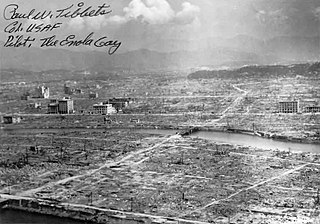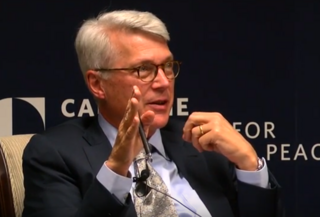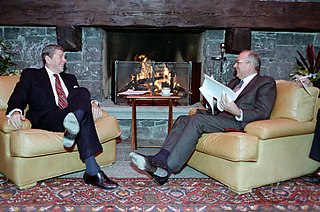
A nuclear weapon is an explosive device that derives its destructive force from nuclear reactions, either fission or a combination of fission and fusion reactions, producing a nuclear explosion. Both bomb types release large quantities of energy from relatively small amounts of matter.

Nuclear disarmament is the act of reducing or eliminating nuclear weapons. Its end state can also be a nuclear-weapons-free world, in which nuclear weapons are completely eliminated. The term denuclearization is also used to describe the process leading to complete nuclear disarmament.

William James Perry is an American mathematician, engineer, businessman, and civil servant who was the United States Secretary of Defense from February 3, 1994, to January 23, 1997, under President Bill Clinton. He also served as Deputy Secretary of Defense (1993–1994) and Under Secretary of Defense for Research and Engineering (1977–1981).

Samuel Augustus Nunn Jr. is an American politician who served as a United States Senator from Georgia (1972–1997) as a member of the Democratic Party.

Deterrence theory refers to the scholarship and practice of how threats of using force by one party can convince another party to refrain from initiating some other course of action. The topic gained increased prominence as a military strategy during the Cold War with regard to the use of nuclear weapons and is related to but distinct from the concept of mutual assured destruction, according to which a full-scale nuclear attack on a power with second-strike capability would devastate both parties. The central problem of deterrence revolves around how to credibly threaten military action or nuclear punishment on the adversary despite its costs to the deterrer. Deterrence in an international relations context is the application of deterrence theory to avoid conflict.

As the collapse of the Soviet Union appeared imminent, the United States and their NATO allies grew concerned of the risk of nuclear weapons held in the Soviet republics falling into enemy hands. The Cooperative Threat Reduction (CTR) program was initiated by the Nunn–Lugar Act, which was authored and cosponsored by Sens. Sam Nunn (D-GA) and Richard Lugar (R-IN). The purpose of the CTR Program was originally "to secure and dismantle weapons of mass destruction and their associated infrastructure in former Soviet Union states." As the peace dividend grew old, an alternative 2009 explanation of the program was "to secure and dismantle weapons of mass destruction in states of the former Soviet Union and beyond". The CTR program funds have been disbursed since 1997 by the Defense Threat Reduction Agency (DTRA).

Max Kampelman was an American diplomat.

The Nuclear Threat Initiative, generally referred to as NTI, is a non-profit organization located in Washington, D.C. NTI was founded in 2001 by former U.S. Senator Sam Nunn and philanthropist Ted Turner and describes itself as a "a nonprofit, nonpartisan global security organization focused on reducing nuclear, biological, and emerging technology threats imperiling humanity."

The nuclear weapons debate refers to the controversies surrounding the threat, use and stockpiling of nuclear weapons. Even before the first nuclear weapons had been developed, scientists involved with the Manhattan Project were divided over the use of the weapon. The only time nuclear weapons have been used in warfare was during the final stages of World War II when USAAF B-29 Superfortress bombers dropped atomic bombs on the Japanese cities of Hiroshima and Nagasaki in early August 1945. The role of the bombings in Japan's surrender and the U.S.'s ethical justification for them have been the subject of scholarly and popular debate for decades.
The Prevention of Nuclear War Agreement was created to reduce the danger of nuclear war between the United States and the Union of Soviet Socialist Republics. The agreement was signed at the Washington Summit, on June 22, 1973. The United States and the U.S.S.R. agreed to reduce the threat of a nuclear war and establish a policy to restrain hostility.

Scott Douglas Sagan is the Caroline S.G. Munro Professor of Political Science at Stanford University and co-director of Stanford's Center for International Security and Cooperation (CISAC). He is known for his research on nuclear weapons policy and nuclear disarmament, including discussions of system accidents, and has published widely on these subjects.
Irma Arguello is an international security expert from Argentina. She founded and chairs the Nonproliferation for Global Security Foundation (NPSGLOBAL), a private, non-profit initiative oriented to help reduce risks derived from the proliferation and use of armaments, with a special emphasis on weapons of mass destruction. The organization is also devoted to building up adequate and opportune responses to such threats at all levels in order to increase global security.

George Pratt Shultz was an American economist, businessman, diplomat and statesman. He served in various positions under two different Republican presidents and is one of the only two persons to have held four different Cabinet-level posts, the other being Elliot Richardson. Shultz played a major role in shaping the foreign policy of the Ronald Reagan administration, and conservative foreign policy thought thereafter.
Project Sapphire was a successful 1994 covert operation of the United States government in cooperation with the Kazakhstan government to reduce the threat of nuclear proliferation by removing nuclear material from Kazakhstan as part of the Cooperative Threat Reduction Program, which was authorized by the Soviet Nuclear Threat Reduction Act of 1991.
Bruce Gentry Blair was an American nuclear security expert, research scholar, national security expert, the author of articles and books on nuclear topics, and a television show producer.
The Top Level Group of UK Parliamentarians for Multilateral Nuclear Disarmament and Non-proliferation (TLG) is a cross-party parliamentary group in the United Kingdom, whose primary focus is the advancement of the nuclear disarmament and non-proliferation agenda in Britain and internationally. It is formed of almost all the former senior Ministers of foreign affairs and defence over the last two decades and includes former Chiefs of Defence and two former NATO Secretaries General.

The Geneva Summit of 1985 was a Cold War-era meeting in Geneva, Switzerland. It was held on November 19 and 20, 1985, between U.S. President Ronald Reagan and Soviet General Secretary Mikhail Gorbachev. The two leaders met for the first time to hold talks on international diplomatic relations and the arms race.

The theft of fire for the benefit of humanity is a theme that recurs in many world mythologies, symbolizing the acquisition of knowledge, or technology, and its transformative impact on civilization. Its recurrent themes include trickster figures as the thief, and supernatural heroic guardians who hoard fire from humanity, often out of mistrust for humans. These myths reflect the profound significance of fire in human history, seen as a pivotal step in the development of human society.

The Bomb is a 2015 American documentary film about the history of nuclear weapons, from theoretical scientific considerations at the very beginning, to their first use on August 6, 1945, to their global political implications in the present day. The film was written and directed by Rushmore DeNooyer for PBS. The project took a year and a half to complete, since much of the film footage and images were only recently declassified by the United States Department of Defense.














